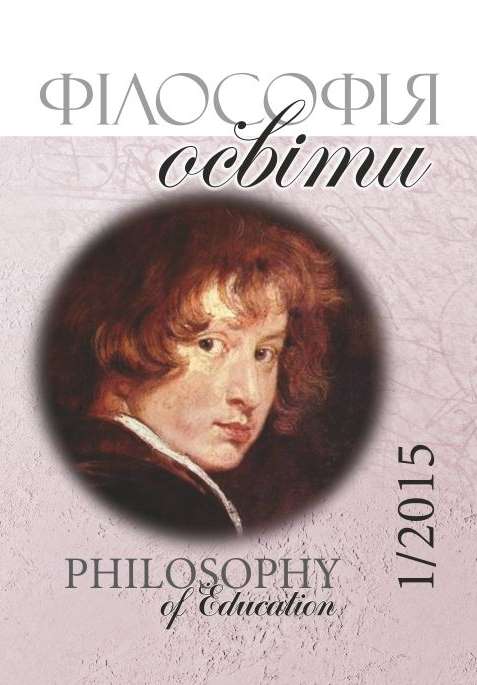The Experience of Liminality: Social and Anthropological Grounds of Transformative Learning
Keywords:
liminality, ransition experience, rites of passage, communitas, charisma, mimesis, trickster, schismogenesis, transformationAbstract
The current situation in Ukraine and in the world is characterized by “fluidity” and the instability of the former “hard” hierarchical structures and institutions, widespread process of transition and transformation in all spheres and at all levels of human life. Global processes of culture transformation form the need for transformation education of adult individuals, which are able to become the responsible subjects of social processes, but not the part of the manipulated masses. The responsible approach to the implementation of transformation learning involves understanding its complexity and risk, and therefore requires a serious analysis of the current conceptual and theoretical tools, with which it is possible to study and model the processes of transformation and individuals’ self-transformation. The author carries out the historical and theoretical reconstruction of the concept of liminality and additional concepts of the given categorical tools, which were used for understanding the transition experience in social anthropology with its following extension to the whole sphere of social knowledge, namely: communitas, charisma, mimesis, trickster, schismogenesis, crisis, transformation. It is emphasized the need of research and awareness of liminality as one of the most important conceptual tools which are innovative and at he same time deeply rooted in the most significant historical and anthropological traditions of humanity. Just this notion is the key for understanding the nature of transformation adult education and awareness of high responsibility in the practical implementation of such learning.
References
Бажанов Борис (1992). Воспоминания бывшего секретаря Сталина. Книгоизда-
тельство «Всемирное слово», Санкт-Петербург, «Третья Волна», Париж, 1980.
Бейлис В.А. (1983). Теория ритуала в трудах Виктора Тэрнера / Тэрнер В. Символ
и ритуал. М. Главная редакция восточной литературы изд-ва «Наука», 1983. – сс.
-30.
Геннеп А., ван (2002 [1909]). Обряды перехода: Систематическое изучение обря-
дов / Арнольд ван Геннеп; Пер. с франц. Ю.В.Ивановой, Л.В.Покровской. – М.:
Вост.лит. – 198 с.
Горбунова Л. (2013). Теорія трансформативного навчання: освіта для дорослих в
умовах «плинної сучасності» // Філософія освіти. Philosophy of Education, 2013,
№2 (13), сс. 66-114.
Жирар Р. (2000). Насилие и священное / Пер. с франц. Г.Дашевского. М.: Новое
литературное обозрение. – 400 с.
Козеллек Р. (2005). «Простір досвіду» та «горизонт очікувань» – дві історичні ка-
тегорії / «Минуле майбутнє: Про семантику історичного часу» / Пер. з нім. – К.:
Дух і літера. – 380 с.
Лебон Г.(2011). Психология народов и масс. – М.: Академический проект. – 238 с.
Паточка, Я.(2011). Европа и пост-Европа: постевропейская эпоха и ее духовные
проблемы / Я. Паточка. – Минск. – 240 с.
Смелзер Н. (1994). Социология: пер. с англ. – М.: Феникс. – 688 с.
Тард Г. (2011). Законы подражания: Пер. с фр.– М.: Академический проект. – 304 с.
Тэрнер В. (1983). Символ и ритуал. М.: «Наука». – 277 с.
Фуко М. (1998). История сексуальности – III: Забота о себе / Пер. с фр.
Т.Н.Титовой и О.И.Хомы под общей ред. А.Б.Мокроусова. – Киев: Дух и литера;
Грунт; М.: Рефл.-бук. – 288 с.
Элиас Н. (2002). Придворное общество: исследования по социологии короля и
придворной аристократии. – М. : Языки славянской культуры. – 368 c.
Элиас Н. (2003). О процессе цивилизации: социогенетические и психогенети-
ческие исследования. В 2-х томах. Санкт-Петербург: Университетская книга. –
Т.1.-332 с.; Т.2. – 382 с.
Austin, J. (1962). How to Do Things With Words, Oxford: Clarendon Press.
Bateson, G. (1958). Naven, Stanford: Stanford University Press.
Borkenau, F. (1981)����������������������������������������������������������������.��������������������������������������������������������������� End and Beginning: On the Generations of Cultures and the Origins
of the West, ed.by Richard Lowenthal, New York: Columbia University Press.
Douglas, M. (1996). Natural Symbols: Explorations in Cosmology, London: Routledge.
Holton, R. J. (1987)��������������������������������������������������������������������.������������������������������������������������������������������� “The Idea of Crisis in Modern Society”, British Journal of Sociology
, 4: 502–20.
Horvath, A. and Thomassen, B. (2008). “Mimetic Errors in Liminal Schismogenesis:
On������������������������������������������������������������������������������������ �����������������������������������������������������������������������������������the Political Anthropology of the Trickster”, in International Political Anthropology
(1): 3-24.
Koselleck, R. (1988[1959]). Critique and Crisis, Oxford: Berg.
Koselleck, R. (1989)����������������������������������������������������������������.��������������������������������������������������������������� “Linguistic Change and the History of Events”, Journal of Modern
History 61, 4: 649-666.
Szakolczai, A. (2007). Sociology, Religion and Grace: A Quest for the Renaissance,
London: Routledge.
Szakolczai Arpad (2009). Liminality and Experience: Structuring transitory situations
and transformative events/ International Political Anthropology Vol. 2 (2009) No. 1,
pp. 141-172. http://www.academia.edu/8343072/Liminality_and_Experience_Structuring_
transitory_situations_and_transformative_events
Turner, V. (1967). “Betwixt and Between: The Liminal Period in Rites de Passage”, in
The Forest of Symbols, New York: Cornell University Press.
Turner, V. (1995[1969]). The Ritual Process, Chicago: Aldine.
Turner V. W.(1974a). Metaphors of Antistructure in Religious Culture. — Changing
Perspectives in the Scientific Study of Religion. N. Y. e. a., 1974.
Turner V. W. (1974b). The Ritual Process: Structure and Anti-Structure. Harmondsworth,
Turner, V. (1975)������������������������������������������������������������������.����������������������������������������������������������������� Revelation and Divination in Ndembu Ritual, Ithaca: Cornell University
Press.
Turner, V. (1985). “The Anthropology of Performance”, in E. Turner (ed.) On the Edge
of the Bush, Tucson, Arizona: The University of Arizona Press, pp. 177-204.
Voegelin, E. (1956/87)���������������������������������������������������������������.�������������������������������������������������������������� Order and History, 5 Vols, Baton Rouge: Louisiana State Univer-
sity Press.
Voegelin, E. (1997/9). History of Political Ideas, 8 Vols, Colombia, MO: University
of Missouri Press.
Weber, M. (1978). Economy and Society, Berkeley: University of California Press.
Wydra, H. (2001). Continuities in Poland’s Permanent Transition, London: Palgrave.
Wydra, H. (2007). Communism and the Emergence of Democracy.
Downloads
-
PDF (Українська)
Downloads: 383
Published
How to Cite
Issue
Section
License
- Authors who publish with this journal agree to the following terms:
- Authors retain copyright and grant the journal right of first publication;
- Authors are able to enter into separate, additional contractual arrangements for the non-exclusive distribution of the journal's published version of the work (e.g., post it to an institutional repository or publish it in a book), with an acknowledgement of its initial publication in this journal.





